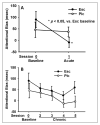Effects of escitalopram on attentional bias to cocaine-related stimuli and inhibitory control in cocaine-dependent subjects
- PMID: 23761390
- PMCID: PMC4057042
- DOI: 10.1177/0269881113492898
Effects of escitalopram on attentional bias to cocaine-related stimuli and inhibitory control in cocaine-dependent subjects
Abstract
Key characteristics of cocaine dependence include attentional bias to cocaine cues and impaired inhibitory control. Studies suggest that serotonin modulates both cocaine cue reactivity and inhibitory control. We investigated effects of the selective serotonin reuptake inhibitor escitalopram on cocaine cue reactivity and inhibitory processes in cocaine-dependent subjects. In a double-blind placebo-controlled design, cocaine-dependent subjects received placebo (n=12) or escitalopram (n=11; 10 mg on days 1-3, 20 mg on days 4-24 and 10 mg on days 25-28) orally, once daily for 4 weeks. The cocaine Stroop and immediate memory task (IMT) were administered at baseline, days 1, 4, 11, 18 and 25 after placebo or escitalopram initiation. There were no significant between-group differences in baseline performance on the cocaine Stroop task or the IMT. On day 1 (acute phase), escitalopram produced a significantly greater decrease from baseline than placebo in attentional bias measured by cocaine Stroop task 5 hours post-dose. No significant changes from baseline in attentional bias were observed on subsequent test days (chronic phase). Inhibitory control as measured by IMT commission error rate was not significantly different between two groups in either the acute or chronic phase. Consistent with preclinical data, serotonin-modulating drugs like escitalopram may have acute effects on cocaine cue reactivity in human cocaine users.
Keywords: Escitalopram; attentional bias; cocaine Stroop task; cocaine dependence; inhibitory control.
Figures

Similar articles
-
Modafinil, but not escitalopram, improves working memory and sustained attention in long-term, high-dose cocaine users.Neuropharmacology. 2013 Jan;64:472-8. doi: 10.1016/j.neuropharm.2012.06.064. Epub 2012 Jul 13. Neuropharmacology. 2013. PMID: 22796108 Clinical Trial.
-
Relationship between attentional bias to cocaine-related stimuli and impulsivity in cocaine-dependent subjects.Am J Drug Alcohol Abuse. 2011 Mar;37(2):117-22. doi: 10.3109/00952990.2010.543204. Epub 2011 Jan 5. Am J Drug Alcohol Abuse. 2011. PMID: 21204739 Free PMC article.
-
Differential effects of escitalopram on attention: a placebo-controlled, double-blind cross-over study.Psychopharmacology (Berl). 2009 Dec;207(2):213-23. doi: 10.1007/s00213-009-1649-6. Epub 2009 Sep 16. Psychopharmacology (Berl). 2009. PMID: 19756527 Clinical Trial.
-
Escitalopram : a review of its use in the management of major depressive and anxiety disorders.CNS Drugs. 2003;17(5):343-62. doi: 10.2165/00023210-200317050-00004. CNS Drugs. 2003. PMID: 12665392 Review.
-
[Escitalopram: a selective inhibitor and allosteric modulator of the serotonin transporter].Encephale. 2007 Dec;33(6):965-72. doi: 10.1016/j.encep.2007.11.001. Epub 2007 Dec 11. Encephale. 2007. PMID: 18789789 Review. French.
Cited by
-
Serotonergic Systems in the Pathophysiology of Ethanol Dependence: Relevance to Clinical Alcoholism.ACS Chem Neurosci. 2015 Jul 15;6(7):1026-39. doi: 10.1021/cn5003573. Epub 2015 Feb 19. ACS Chem Neurosci. 2015. PMID: 25654315 Free PMC article. Review.
-
A critical review of the literature on attentional bias in cocaine use disorder and suggestions for future research.Exp Clin Psychopharmacol. 2014 Dec;22(6):469-83. doi: 10.1037/a0037806. Epub 2014 Sep 15. Exp Clin Psychopharmacol. 2014. PMID: 25222545 Free PMC article. Review.
-
Recent Advances in Attention Bias Modification for Substance Addictions.Int J Environ Res Public Health. 2018 Apr 4;15(4):676. doi: 10.3390/ijerph15040676. Int J Environ Res Public Health. 2018. PMID: 29617325 Free PMC article. Review.
-
Cocaine modulates mammalian circadian clock timing by decreasing serotonin transport in the SCN.Neuroscience. 2014 Sep 5;275:184-93. doi: 10.1016/j.neuroscience.2014.06.012. Epub 2014 Jun 17. Neuroscience. 2014. PMID: 24950119 Free PMC article.
-
Cocaine Cues Used in Experimental Research: A Systematic Review.Brain Sci. 2025 Jun 10;15(6):626. doi: 10.3390/brainsci15060626. Brain Sci. 2025. PMID: 40563797 Free PMC article. Review.
References
-
- Ataya AF, Adams S, Mullings E, et al. Internal reliability of measures of substance-related cognitive bias. Drug Alcohol Depend. 2012;121:148–151. - PubMed
-
- Batki SL, Washburn AM, Delucchi K, et al. A controlled trial of fluoxetine in crack cocaine dependence. Drug Alcohol Depend. 1996;41:137–142. - PubMed
-
- Beck AT, Steer RA, Brown GK. Manual for the Beck depression inventory-II 2nded. Psychological Corporation; San Antonio, TX: 1996.
-
- Bosker FJ, Cremers TI, Jongsma ME, et al. Acute and chronic effects of citalopram on postsynaptic 5-hydroxytryptamine(1A) receptor-mediated feedback: A microdialysis study in the amygdala. J Neurochem. 2001;76:1645–1653. - PubMed
Publication types
MeSH terms
Substances
Grants and funding
LinkOut - more resources
Full Text Sources
Other Literature Sources
Medical

